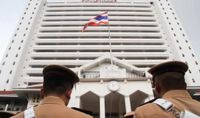On August 17, 2025, the Royal Thai Police headquarters in Bangkok buzzed with an atmosphere of both anticipation and tension as high-ranking officials gathered to determine the annual reshuffle of top police positions for the year 2568 (2025). The day-long meeting, which began at 9:00 AM and stretched well into the evening, was not just a bureaucratic formality—it was a critical juncture for Thailand’s law enforcement leadership, one that would shape the direction of the police force for the coming year.
Presiding over the session was Police General Kittirat Phanphet, the current Commissioner-General of the Royal Thai Police, who led the screening board—known colloquially as the “board of scrutiny.” According to Bangkok Biz News, the meeting took place in Conference Room 2 on the second floor of the police headquarters, and was attended by a formidable roster of top brass. Among them were Deputy Commissioners-General Police General Kraiboon Thruatsong, Police General Thana Chuwong, Police General Prachuap Wongsuk, Police General Kornchai Klaiklueng, Police General Niran Lueamsri, and Police General Thatchai Pitaneelabut, as well as Inspector-General Police General Itthiphon Atchariyapradit and several other senior officials.
The main order of business was to fill a host of vacant positions—two Deputy Commissioner-General posts, seven Assistant Commissioner-General roles, sixteen Commissioner positions, forty Deputy Commissioner slots, and seventy-one Provincial Police Commander roles. The process, as reported by Thai Post, was meticulous and, at times, fraught with debate. Each candidate’s qualifications were scrutinized to ensure alignment with the Police Act of 2022 and the regulations set forth by the Police Commission.
For the coveted Deputy Commissioner-General positions, tradition and regulation dictated that seniority would be the guiding principle. The board ultimately decided to promote Police Lieutenant General Samran Nualma, the most senior Assistant Commissioner-General, to Deputy Commissioner-General. Meanwhile, Police Lieutenant General Itthiphon Atchariyapradit, then serving as Deputy Inspector-General and third in seniority, was elevated to the role of Inspector-General of the Royal Thai Police. Notably, the name of Police Lieutenant General Dr. Sophonrat Singharach, the second most senior assistant, was temporarily suspended from consideration due to an ongoing investigation related to the suspension of his medical license, as outlined by the Medical Council. The board agreed to revisit his case once the inquiry concluded.
The reshuffle didn’t stop there. Seven Assistant Commissioner-General posts were also up for grabs. The board, following the established seniority order, named Police Lieutenant General Surapong Thanomchit (Commander of Region 8), Police Lieutenant General Jiraphop Phuridej (Commander of the Central Investigation Bureau), Police Lieutenant General Naiwat Padermchit (Commander of Region 7), Police Lieutenant General Anucha Ramyanan (Commander of the Royal Thai Police Office), Police Lieutenant General Udon Yomcharoen (Commander of the Police Education Bureau), Police Lieutenant General Yingyos Thepchamnong (Commander of Region 2), and Police Lieutenant General Trirong Phiwphan (Commander of the Cyber Crime Investigation Bureau) as the new Assistant Commissioner-Generals.
However, the process was not without its complications. According to Thai Post, the board recommended suspending the candidacy of Police Lieutenant General Dr. Taweesilp Vetchavitharn, the sixth most senior candidate and chief medical officer at the Police General Hospital, due to a pending investigation similar to that of Dr. Sophonrat. Should the Police Commission agree to the suspension, Police Lieutenant General Trirong Phiwphan, eighth in seniority, would move up to fill the Assistant Commissioner-General post.
The selection of Police Commissioners, a group that plays a pivotal role in managing the country’s regional and specialized police units, also drew extensive discussion. The board filled sixteen Commissioner positions, again relying on a mix of seniority and suitability. The list included Police Major General Kritsada Kaeojandee (Deputy Commander of Region 9), Police Major General Chaitapon Suwannarak (Deputy Commander of Region 2), Police Major General Yaswin Hansamon (Deputy Commander of the Education Bureau), Police Major General Silpakom Iamwong (Deputy Commander of Region 1), Police Major General Paiboon Noihun (Deputy Commander of the Central Investigation Bureau), Police Major General Wimon Pitakbura (Deputy Commander of Region 7), Police Major General Attasit Sudsanguan (Deputy Commander of the Cyber Crime Bureau), and Police Major General Hatschai Ruangmalai (Deputy Commander of the Forensic Science Bureau), among others.
Several high-profile transfers were also expected. For instance, Police Lieutenant General Sitthichai Lokanpai (Commander of the Royal Thai Police Personnel Division) was slated to become Commander of the Border Patrol Police, while Police Lieutenant General Suraphon Prembut (Commander of Region 1) was moved to lead the Cyber Crime Investigation Bureau. Other notable moves included Police Lieutenant General Chatrachai Surachetphong (Commander of Region 4) shifting to Region 2, and Police Lieutenant General Santi Chainiramai (Commander of the Narcotics Suppression Bureau) taking over Region 4. Police Lieutenant General Atchayon Kraithong (Commander of the Police Education Bureau) was appointed to head the Narcotics Suppression Bureau, and Police Lieutenant General Phisit Tanprasert (Commander of the Budget Bureau) was transferred to Region 7.
Despite the extensive reshuffling, some key figures remained in their current posts. Police Lieutenant General Siam Boonsom (Commander of the Metropolitan Police), Police Lieutenant General Panumas Boonyalak (Commander of the Immigration Bureau), Police Lieutenant General Kritthaphon Yisakhon (Commander of Region 5), and Police Lieutenant General Saksira Phuak-am (Commander of the Tourist Police) all retained their positions, signaling stability in certain critical areas.
Throughout the day, the atmosphere in the meeting room was described as tense. The board members repeatedly questioned the suitability of nominees, delving into their backgrounds and ensuring compliance with the law. The process was slow and deliberate, reflecting the gravity of the decisions at hand. As Bangkok Biz News reported, “Each position required considerable time for review, as the qualifications of the nominees were closely examined.”
Adding to the significance of the day, the Royal Thai Air Force celebrated its 68th anniversary with a ceremonial parade and an impressive flyover at the Air Force base. The event, which ran from 9:00 AM to 10:00 AM, featured a display of multiple aircraft types and was attended by military personnel, high-ranking officials, and members of the public. The flyover included 50 aircraft from various squadrons, symbolizing both tradition and the enduring strength of Thailand’s armed forces. As Thai Post noted, the celebration marked “68 years since the founding of the Royal Thai Air Force,” underscoring the day’s dual importance for the country’s security institutions.
In the end, while some appointments and transfers were straightforward, others were left pending further investigation. The reshuffle underscored the complex balance between seniority, merit, and regulatory compliance that defines Thailand’s police leadership. With new faces in key positions and a renewed sense of accountability, the Royal Thai Police now looks to the future—one shaped by both tradition and the pressing needs of today’s society.
As the sun set over Bangkok, the decisions made within those conference room walls promised to reverberate across the nation’s law enforcement agencies, setting the stage for another year of challenges, reforms, and—hopefully—progress.




